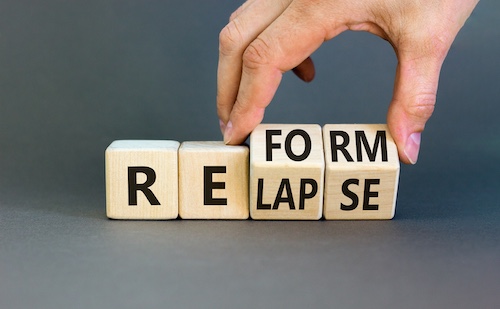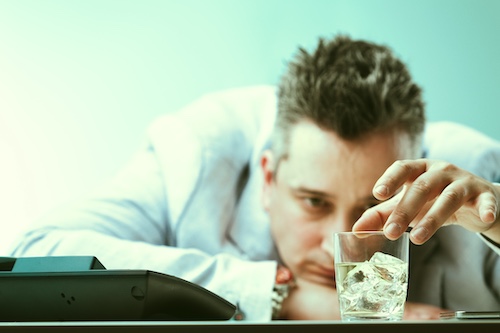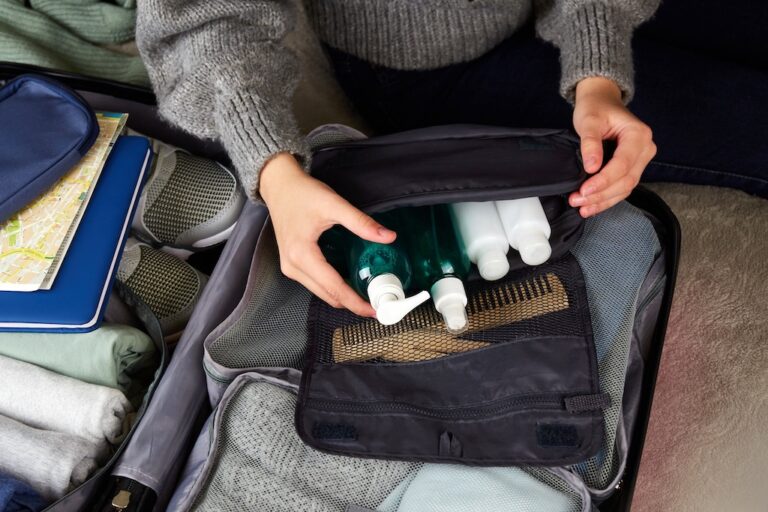Understanding Relapse: A Common Part of Recovery
Relapse is one of the most challenging parts of addiction recovery. It can feel like failure, but it is not. In fact, relapse often signals that something in the treatment or recovery plan needs to change. Knowing the definition of a relapse, how it happens, and how to respond gives people the tools to regain control.
In this blog, we explain what relapse means, break down its stages, explore why relapse happens, and share how to deal with it effectively, including how our Fayetteville addiction treatment center at Carolina Recovery can support you through recovery.
The Definition of a Relapse
Understanding the definition of a relapse is the first step in building effective relapse prevention strategies and supporting long-term recovery.
What Is a Relapse?
A relapse is the return to substance use after a period of abstinence. It often follows a breakdown in coping skills and may occur during high-risk situations or after exposure to drug-related cues. In addiction recovery, relapse is common and should be viewed as a signal that changes are needed in a treatment plan, not as a failure.
Relapse can happen with any addictive substance, including alcohol, prescription medications, or illicit drugs. It is part of the recovery process for many people with substance use disorder. Recognizing it early can prevent a full return to uncontrolled use.
Initial Lapse vs. Full Relapse
An initial lapse is the first use of a substance after abstinence. A full relapse is a return to ongoing substance abuse. The difference matters. Some people stop after a lapse and re-engage with recovery. Others continue using and face more severe consequences.
This is where the abstinence violation effect can occur. Once someone breaks abstinence, they may believe recovery is over. This belief increases negative emotions and weakens the ability to stop using again. Understanding this effect helps prevent further relapse.
How Relapse Happens Over Time
Relapse is a process, not a single event. It builds over time through stages: emotional relapse, mental relapse, and physical relapse. Each stage includes warning signs such as withdrawal from social support, intense cravings, and negative feelings. By learning coping strategies early, it is possible to prevent relapse before physical use occurs.
Relapse in the Context of Treatment
Relapse often means a person needs a stronger or different treatment approach. At our Fayetteville addiction treatment center, we use evidence-based methods to help clients understand why relapse happens and how to prevent it. This includes therapy, medications, peer support groups, and relapse prevention planning.
Relapse is not the end of the recovery process. It is a call to adjust the treatment plan and continue forward.
The Three Stages of Relapse
Relapse develops in stages. Recognizing each one early helps prevent a return to substance use.
Emotional Relapse
Emotional relapse is the first stage. The person is not thinking about drug or alcohol use yet, but their behavior changes. Common signs include anxiety, mood swings, isolation, poor sleep, and not using coping skills. Ignoring self-care routines and skipping support group meetings like Alcoholics Anonymous or SMART Recovery are also warning signs.
People in emotional relapse often avoid talking about their feelings. They stop seeking social support and push through stress on their own. These habits build pressure that can lead to mental relapse.
Mental Relapse
In this stage, the person starts thinking about using drugs or alcohol again. They may remember past substance use as enjoyable and block out the negative consequences. Cravings become stronger, and the person may plan how and when to use again.
Mental relapse includes inner conflict. One part wants to stay sober, but another part is tempted by the idea of relief or escape. Common thoughts include “One drink won’t hurt” or “I can control it this time.” Exposure to drug-related cues and high-risk situations increases these cravings.
Physical Relapse
Physical relapse is the final stage. It is when the person uses an addictive substance again. This may start as a single use or quickly turn into uncontrolled substance use. The longer someone stays in emotional or mental relapse without support, the more likely physical relapse becomes.
Recognizing the signs early can help prevent relapse from reaching this point. Learning coping strategies, building support systems, and staying engaged in addiction treatment are key parts of relapse prevention.
Why Relapse Happens
Relapse can happen for many reasons. Understanding the causes helps reduce the risk and improve recovery outcomes.
Internal Triggers
Internal triggers are thoughts, emotions, or beliefs that increase the urge to return to substance use. These include stress, boredom, anger, sadness, and other negative feelings. Many people relapse when they feel overwhelmed and cannot manage these emotions.
Mental health conditions such as depression and anxiety increase the risk of relapse. Without proper treatment, these conditions can lead to poor coping and withdrawal from social support. Negative beliefs like “I will never get better” also weaken motivation to stay sober.
External Triggers
External triggers are situations or environments linked to past drug or alcohol use. These include social events, certain people, or places tied to substance use. Seeing alcohol, hearing drug-related talk, or being around old friends who use can all act as triggers.
Family members may also become stress points, especially during conflict or unresolved issues. Without support or communication, these moments can raise cravings and reduce self-control.
Poor Coping Strategies
Many people relapse because they have not learned or used healthy coping strategies. Instead of using tools like exercise, peer support groups, or therapy, they turn to substance use during hard times.
Cravings often feel intense and immediate. Without strong coping skills, it becomes hard to stay focused on long-term recovery. This makes the person more likely to act on the urge.
Physical and Emotional Stress
Stress is a leading cause of relapse. Emotional stress from work, relationships, or daily life can wear down recovery efforts. Physical stress, such as pain or illness, may also increase the urge to use.
Fatigue, poor sleep, and untreated withdrawal symptoms weaken mental strength. This makes it easier for relapse to occur, especially when high-risk situations appear.
Gaps in Treatment or Support
Relapse often happens when treatment ends too early or support systems fade. Recovery takes time. A short treatment program without aftercare or relapse prevention planning increases the chance of relapse.
Support groups like Narcotics Anonymous, Alcoholics Anonymous, or SMART Recovery help many people stay accountable. Without ongoing support, it is harder to manage cravings and stay on track.
Relapse does not mean failure. It shows where support or treatment needs to be stronger. The goal is not just to avoid drug use but to build a stable life with lasting recovery.
How to Deal with a Relapse
Relapse is a sign that something in the recovery process needs attention. Taking the right steps quickly can reduce harm and restore progress.
Acknowledge What Happened
The first step is to admit the relapse without judgment. Hiding it or denying it makes the situation worse. A clear view of what happened helps identify triggers and weak points in the treatment plan.
Relapse is common in addiction recovery. It is not the end. Many people return to recovery stronger after a relapse. What matters most is what happens next.
Reach Out for Support
Tell someone you trust. This may be a sponsor, counselor, peer from a support group, or family member. Talking about the relapse lowers shame and brings back accountability.
Joining peer support groups like Narcotics Anonymous or SMART Recovery helps people feel less alone. These groups offer structure, connection, and shared coping strategies.
Re-engage in Treatment
A relapse often means the current treatment plan needs to change. Returning to a treatment program can help stabilize recovery. This may include outpatient care, therapy, medication, or structured relapse prevention strategies.
Our Fayetteville addiction treatment center offers support for people who have relapsed. We help clients understand what went wrong and build new skills to stay sober.
Review and Adjust Coping Strategies
Look at what coping skills were missing or unused. Stress, negative emotions, or drug-related cues often lead to relapse when not managed. Learning coping strategies again or adding new ones helps prevent relapse in the future.
Therapists may use cognitive behavioral techniques to identify high-risk situations and teach safer responses. Self-care habits like sleep, nutrition, and exercise also support mental strength.
Let Go of Shame and Stay Focused
Relapse can bring guilt and negative feelings. These emotions make recovery harder if left unchecked. It is important to accept the relapse, learn from it, and keep going.
The most important thing is to stay focused on the goal of recovery. A single setback does not erase all progress. With help and a strong plan, it is possible to return to a healthy, sober life.
Visit Our Fayetteville Treatment Center To Start Your Recovery ASAP!
If you or someone you care about has experienced a relapse, know that recovery is still possible—and help is available. Our team at Carolina Recovery in Fayetteville provides compassionate, evidence-based addiction treatment designed to support every stage of the recovery process. Whether this is your first relapse or one of several, we’ll work with you to understand what happened, rebuild coping strategies, and strengthen your path forward.
Contact us at (812) 408-8842 for a free consultation ASAP!





